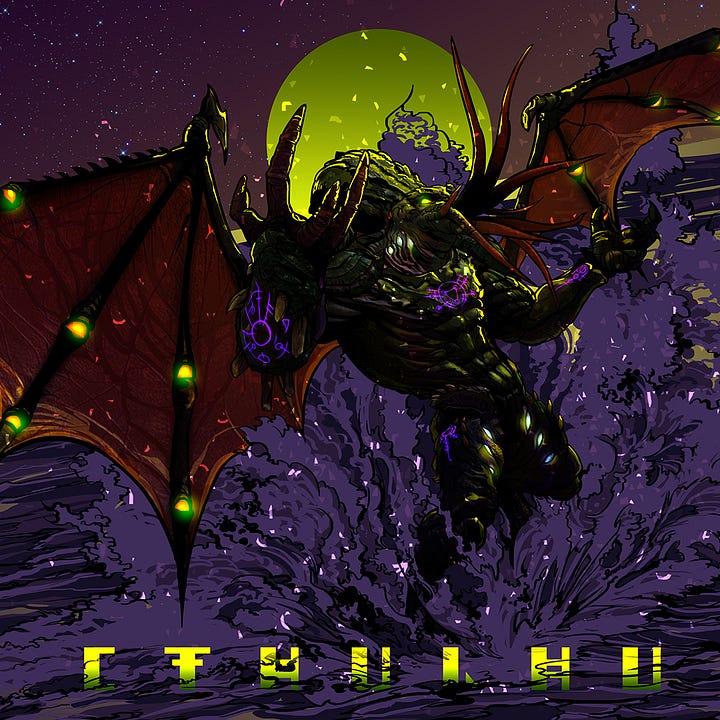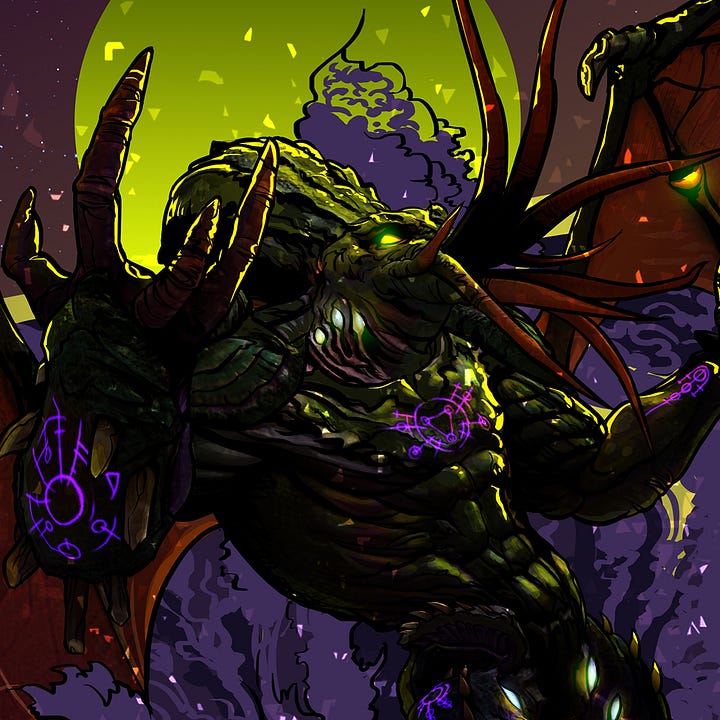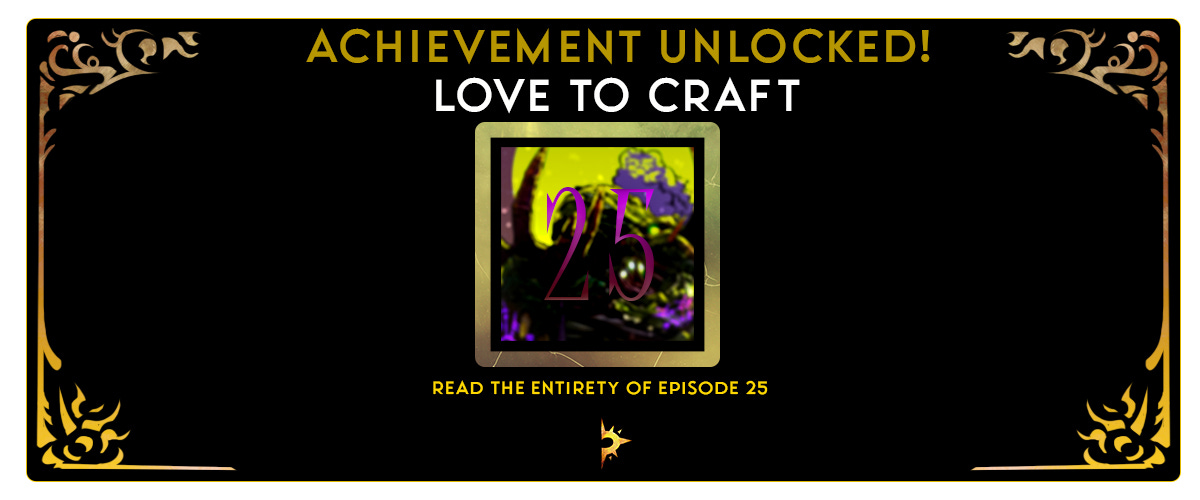Lovecraft and Mythology
Episode 25 - the darkest gods beyond the stars
Greetings,
Hope you’re keeping warm. Stay close to the light, this will be a dark, but exciting one.
A little update on me: I’ve been taking a break from writing after finishing my second novel. That’s a joke, of course, I can’t seem to take breaks from writing since we’re here now. However, I am noticing a little bit of strain in keeping up with my weekly episodes, as well as other creative projects, as well as work and life and also my drawings/art, which is also a huge part of my life.
My writing craft is split into four areas: these newsletters, my books, my creative fantasy/fanfiction work (which is just for me) and my blog. Out of all these, the blog and books are the most curated, deep, profound expressions of my art and they represent my best work in the written format.
While I’m doing what I can to make sure all these four areas always progress, and so far they do, I must be careful not to get burnt out or exhausted. The Muses have been speaking to me for a long time, and I always listen but I must be careful not to take them for granted or choke their voices out for ‘content’.
This is why this episode has taken longer to write and release, and from now on they’ll be released every 10 days, instead of every 7 like the previous ones.
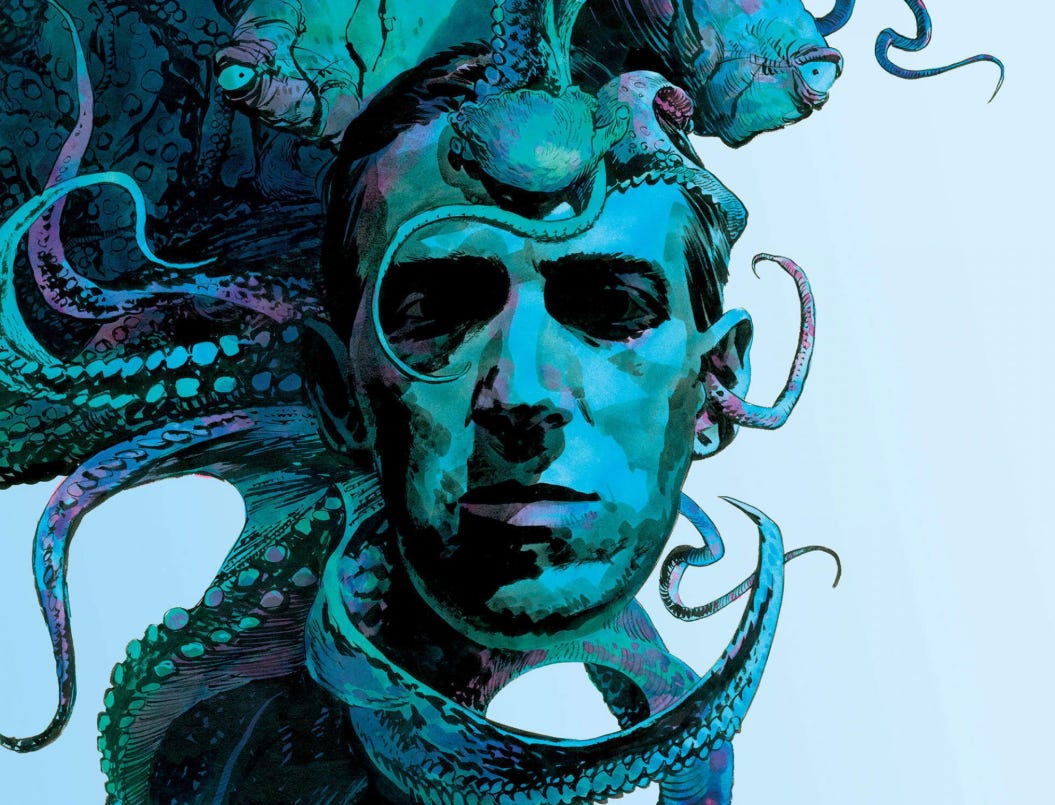
“We live on a placid island of ignorance in the midst of black seas of infinity, and it was not meant that we should voyage far.
The sciences, each straining in its own direction, have hitherto harmed us little; but some day the piecing together of dissociated knowledge will open up such terrifying vistas of reality, and of our frightful position therein, that we shall either go mad from the revelation or flee from the deadly light into the peace and safety of a new dark age.”
This quote from Lovecraft is one of his most popular, and you’ll find it plastered over most articles discussing him and his work. I think it’s incredibly telling of his thought and writings, which culminate in something called ‘Cosmicism’.
More on that below… deep, deep below…
Who Loves to Craft
I’ve always been a huge Lovecraft fan. I think I read most of his work, which is more than I can say about other writers that inspire me. I even wrote my high-school thesis on him and the mythos he shaped have influenced my work across the years.
For those who don’t know him, Howard Phillips Lovecraft (1890-1937) was an American author best known for his contributions to the genre of horror fiction and for the creation of some of the most popular and influential works of horror ever created. His work mostly became famous after his death, to the point where his name became a verb to indicate a specific subgenre: Lovecraftian.
Were his works crafted with Love? Ehh… more like existential dread and continuous torment.
But why am I bringing him up? Because his work, stories and characters were so influential that they somehow seeped into the collective unconscious to the point where other writers of horror borrowed themes, characters and locations for their own stories, expanding the work of Lovecraft into a sort of collective grand story that is continued even today in the form of movies, videogames, other books (including my own and those of many others), music, board games, etc.
Basically, it became Mythology. This is no small feat. In fact, it’s actually an incredible achievement and impossible to attribute to him alone. Lovecraft wasn’t actually that great a writer, but he brought forward something so deeply sinister out of the Great Unconscious that, I think, was recognised by others. And still is.
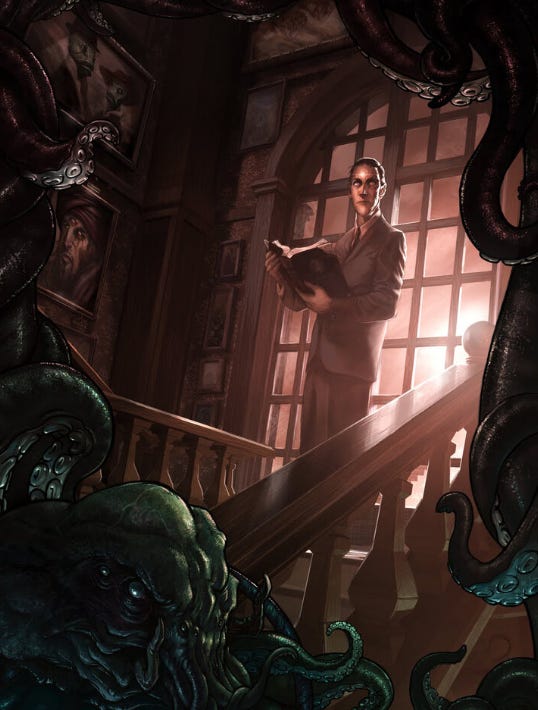
The Life of Lovecraft
I won’t spend too much time on this, as you can find his biography easily elsewhere. Suffice to say the man had a difficult life, as his father succumbed to mental illness and death when he was young, and his own fragile health kept him from joining the other kids at the playground, so to speak. Instead, much like me, Lovecraft preferred the company of books and his own imagination.
As he grew older he tried to pen the stories he saw in the depths of his mind, primarily publishing his work in pup magazines like ‘Weird Tales’, but the damn things never really sold anything, so financial struggle was always a constant. This, alongside a profound sense of isolation after he moved to New York, only added to his ever-growing sense of cosmic dread.
He died in 1937 of cancer and malnutrition, possibly because he couldn’t afford food or wasn’t able/willing to seek other employment aside from his failed career as an author.
Essentially, as far as he saw it, the entire universe couldn’t give less of a damn about him, and this theme became the core of his work.
Why is he so popular?
It’s really sad that Lovecraft never managed to make a living from his art. It wasn’t until about twenty years after his death that scholarly attention grew and brought his stories to mass appeal. If he was alive nowadays, he’d be touring the world giving speeches and attending all sorts of Comicons. Well, probably he wouldn’t, he was not exactly sociable.
Anyway, his collective stories form what is known as the ‘Cthulhu Mythos’, a name that references his most popular character: the alien god Cthulhu. If you somehow have never heard of him and are wondering wtf is up with the name, it’s a complex arrangement of letters because it’s the closest approximation that the human mind can make in translating his original name, which is impossible to understand. Why? Because he’s an alien.
The thing about Lovecraft is that he really really understood the meaning of Alien. His monsters are the opposite of E.T. the friendly alien who gets lost on our planet and needs a way home. They’re not even the xenomorph creature from the movie Alien which, though scary, is pretty much just an animal who hunts its prey.
No, Lovecraft’s aliens truly fit the name: they are impossible to comprehend by the linear, rational human intellect. Their shape? Incomprehensible. Their motivations? Incomprehensible. Their scale? Also incomprehensible. One look at these beings would be enough to drive anyone to madness.
Lovecraft fashioned his creatures by considering the vastness of the cosmos itself: these are beings of such magnitude and absolute horror that they can’t even exist in the same dimension.
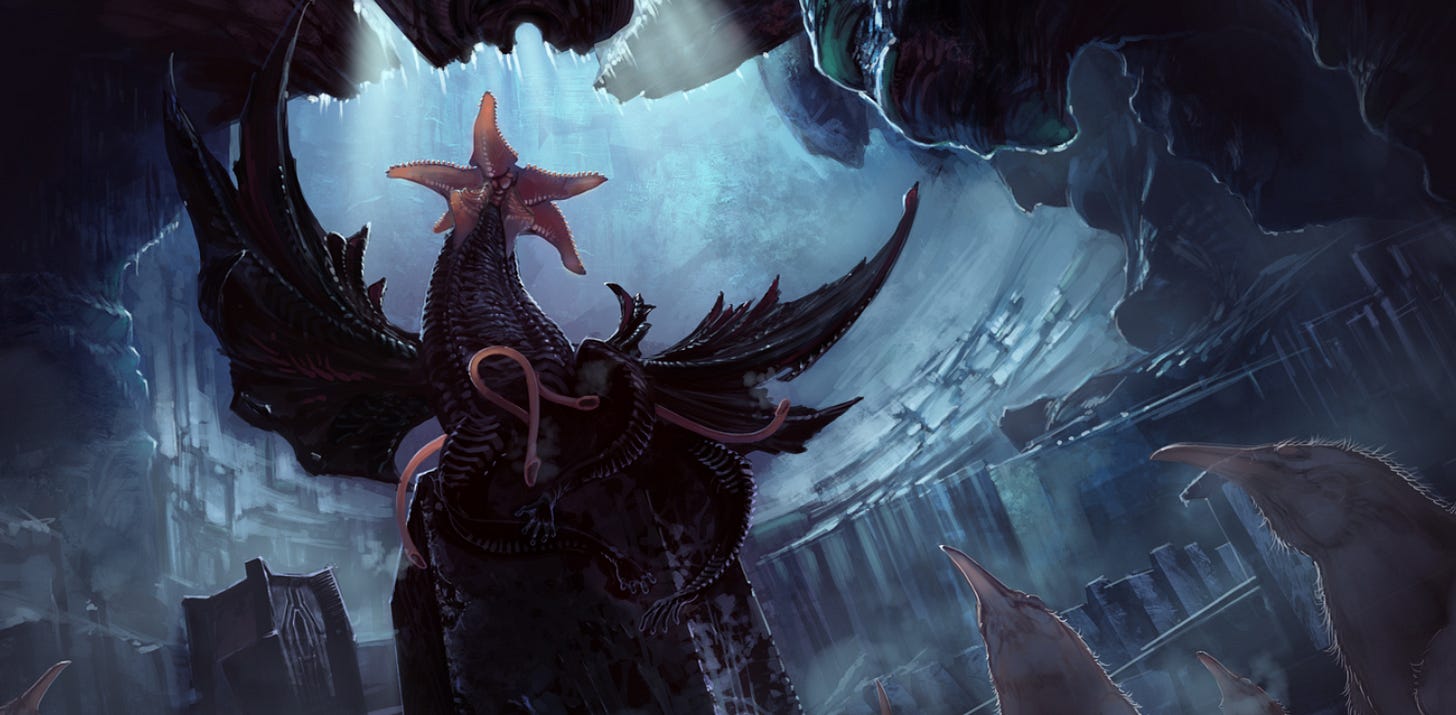
All his short stories feature artists, writers or scientists driven mad by mere fragments and glimpses of these beings. There is a profound mystery to them and an age that defies comprehension. They are so massive and beyond our understanding that, to them, our human planet is a mere speck of dust.
This is likely a representation of the way he felt throughout life.
His most popular stories include:
The Call of Cthulhu - this is where the tentacled being first appears, rising from the waters out of a dead gigantic city lost beneath the ocean. It is there Cthulhu is trapped, constantly dreaming.
At the Mountains of Madness - this is another famous one about an expedition to Antarctica where they discover frozen star-shaped ancient beings that had built cities of incomprehensible geometry and architecture.
The Shadow over Innsmouth - this one has been translated into many movies and videogames across the years. It’s about a visitor to an odd town called Innsmouth where the inhabitants have something… eh, fishy going on.
In 2001 director Stuart Gordon released Dagon, a movie which remains obscure, fitting Lovecraft’s theme I suppose. If you’re a horror fan and want something that will entertain but also deeply disturb you (I still remember some scenes, it can get very grotesque) I recommend it.
The Blind God
Lovecraftian Mythology therefore, is all about the deepest, darkest corners of the cosmos, where beings of profound, incomprehensible madness reside. Human life means nothing to them. There is a deep sense of profound nihilism to it all, and this is what ‘Cosmicism’ is all about.
Alongside the work of other writers who followed in his footsteps, Lovecraft’s philosophy is, quite literally embodied in the greatest demonic God he ever fashioned: Azathoth.
“[…] the boundless daemon sultan Azathoth, whose name no lips dare speak aloud, and who gnaws hungrily in inconceivable, unlighted chambers beyond time and space amidst the muffled, maddening beating of vile drums and the thin monotonous whine of accursed flutes.”
Azathoth is, essentially, a deity of cosmic proportions said to reside in an area of the universe so far that no light can reach. No description of him is possible. Around him, demonic beings dance and play music to keep him asleep because, it is said, if he ever should wake up the entire universe would disappear. Why? Because the whole universe may be nothing more than a twisted dream of his.
You can check out more on him HERE.
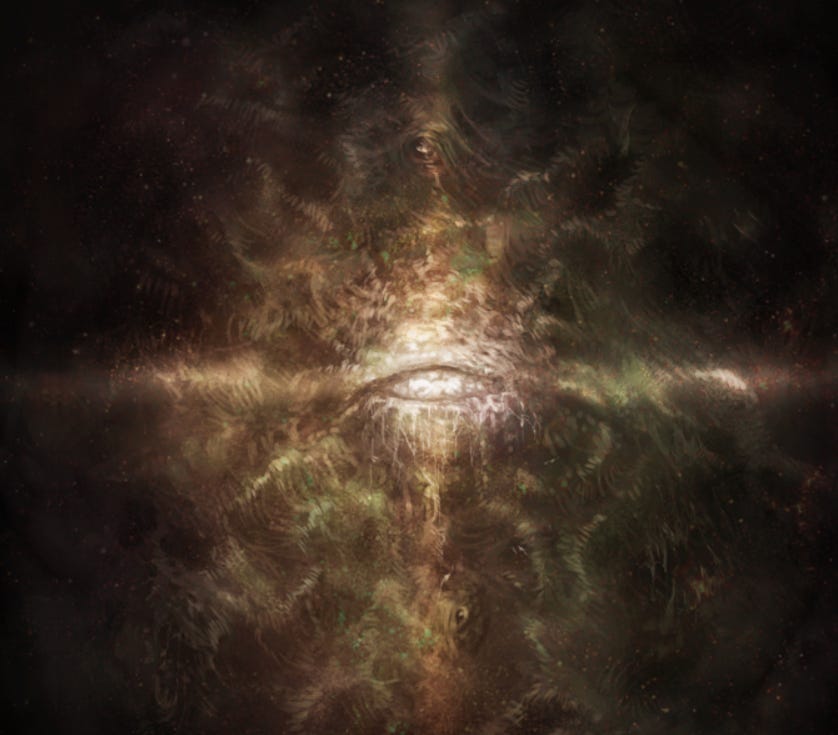
Azathoth is essentially Lovecraft’s ultimate idea of God, or rather an anti-God. It has many of the attributes usually given to a supreme deity, but none of the love. Azathoth simply doesn’t care, he is blind and stupid, and the entire universe is the random product of his twisted imagination. It exists, but it could also not and probably would be better if it didn’t.
What life would a man have to go through to produce such an idea? What bitterness must one embody? What hatred for life?
And yet, strangely enough, it’s also oddly appealing because it’s so dark and hopeless.
Conclusion
Lovecraft’s darkness continues to fascinate us. There’s no shortage of artists online portraying his work in various ways and it always fascinates me to see them stretching their imagination to try and capture what is, essentially, impossible to capture.
In this, I think - in this stretching of the mind to the extreme is the value of Lovecraft’s work. A product of tragedy and hopelessness, but maybe a necessary one. Without him the genre of horror wouldn’t have evolved to where it is today.
More to come.
Blessings,
I also tried my hand recently at a Lovecraft portrayal with my new Artwork featuring CTHULHU, the Great Old One:
